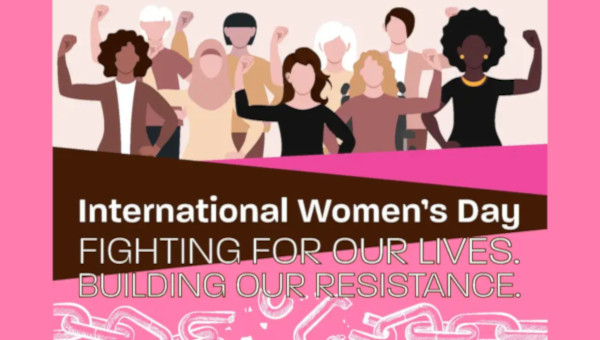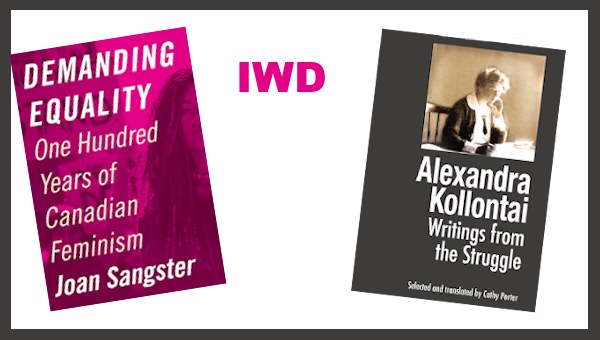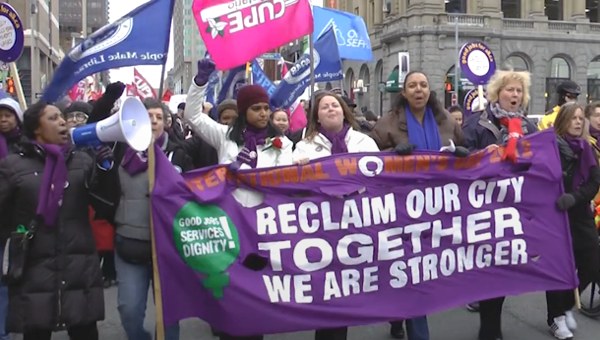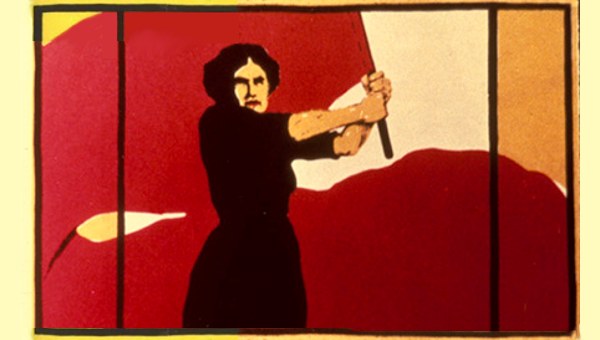January 21 is set to be the day of one of the largest protests in recent U.S. history, the Women’s March on Washington. The widely-publicized protest is expected to dwarf the numbers at Trump’s inauguration, as three times more busses are registered for the Women’s March than for the inauguration. These busses will bring people of all stripes to Washington DC to protest the inauguration of a President who brags about sexually assaulting women and who has bullied and demeaned women throughout his career. His anti-immigrant and anti-Muslim statements and his cabinet full of climate change deniers and billionaires will translate into increased attacks on the majority of women.
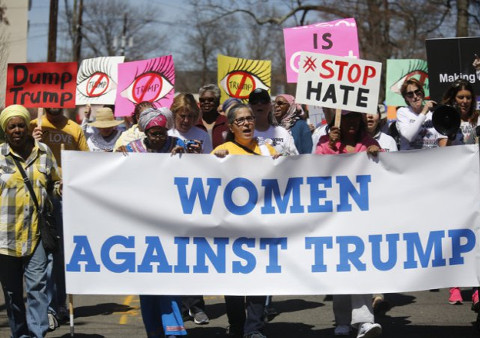 The Women’s March on Washington takes place after a relative lull in the women’s movement during the Obama presidency. Despite attacks on women’s reproductive freedom, immigrant families, trans women and continued structural inequities between men and women, the women’s movement was largely absent from the national stage. The Trump administration will, no doubt, mean increased offensives against women, and the Women’s March demonstrates the potential for the creation of a new, responsive women’s movement. Here, I will outline six elements needed for a women’s movement that is up to the task of not only responding to Trump’s attacks, but of wresting our rights from the government. The Women’s March on Washington is a step in that direction.
The Women’s March on Washington takes place after a relative lull in the women’s movement during the Obama presidency. Despite attacks on women’s reproductive freedom, immigrant families, trans women and continued structural inequities between men and women, the women’s movement was largely absent from the national stage. The Trump administration will, no doubt, mean increased offensives against women, and the Women’s March demonstrates the potential for the creation of a new, responsive women’s movement. Here, I will outline six elements needed for a women’s movement that is up to the task of not only responding to Trump’s attacks, but of wresting our rights from the government. The Women’s March on Washington is a step in that direction.
1. Independence from the Democrats
The Democratic Party has had an important hold on the women’s movement, maintaining the limited argument that women’s rights can only be protected and defended by voting. However, hitching the women’s movement to the Democratic Party has shown itself to be a failed strategy, even on the most basic and politicized issue – the right to an abortion. Facing strongly anti-choice Republicans, many believe that voting for Democrats will maintain our right to choose. However, after eight years of a Democrat in the White House, abortion access is more restricted today than ever. In fact, according to the Washington Post, the past five years account for a quarter of all abortion restrictions enacted since the Supreme Court legalized abortion in 1973.
Yes, these restrictions were passed by Republican legislatures. However, where is the outrage? Where are the mass mobilizations? Why has the energy and money that was spent attempting to get Clinton into office placed at the service of fighting these anti-choice measures? The Democratic Party, despite paying lip service to equal rights for women, cannot and does not even effectively defend the right to choose, much less advance measures vital to working women, such as universal paid family leave and maternity leave.
While the Democrats brand themselves as the supporters of women’s rights, the fact that they have not advanced important women’s rights initiatives, nor have they organized a mass movement for these rights, demonstrates that women cannot trust them to defend or protect our rights. In order to fight Trump, we cannot rely on the compromised Democrats, who vow to work with Trump so that he can have a successful presidency. We must rely on our own strength in the streets and in our workplaces.
Rather than aligning with the Democratic Party, we must fight for unity between social movements, unions, and women’s organizations to defend our rights from Trump’s attacks. We must call for a broad alliance of organizations, despite differences between us, in order to march to protect and advance women’s rights.
2. Take the Streets
This women’s movement must take their struggle to the streets, organizing people to participate at every school, university and workplace. This movement should recognize that the years of negotiating compromises behind closed doors in Washington is a failed strategy. The movement should find inspiration in the Black Lives Matter movement that organized mass protests around the country. It should be inspired by the widespread public demonstrations for women’s rights in Iceland, Poland, and Argentina that overtook streets and shut them down. The solutions to the problems that women face will not be solved by elite politicians, but by millions of people in the streets. The Women’s March is a step in this direction, but it must be seen as such – a step to building a massive women’s movement that sees solutions not in elected officials, but in the strength of organized workers, youth and women.
3. Organize Against All Forms of Oppression
The emergent women’s movement must fight against all forms of oppression. It must have nothing to do with the kind of feminism that struggles solely for issues narrowly defined as “women’s issues” while deeming struggles against police violence and mass incarceration as someone else’s fight. Rather, this new women’s movement can contribute to a fight for our collective liberation by exploring and understanding the ways in which racism, homo- and transphobia and ableism affect women in particular.
This is one of the strengths of the unity principles of the National Women’s March, with clear statements not only against the “isms,” but open denouncements against mass incarceration and police violence. However, the National Women’s March shares the same problem as the Movement for Black Lives Platform in that it does not call for the end of the police, but rather seeks to reform the police. A critique of that position can be found here.
Trump will attack all oppressed people – women, undocumented immigrants, Muslims, people of color and others. Our organization must be prepared to fight against the upcoming assault and take it on as a collective resistance.
4. Organize for Socialism
Capitalism thrives on women’s labour, both paid and unpaid. It profits off of sexism by paying women lower salaries for equal work, and providing low wages for jobs that are considered “female” occupations, like caregiving work. It relegates women to some of the lowest paying jobs and punishes women economically for having children.
Capitalism profits off of women’s labour in the home, by seeing domestic labour as “natural” and therefore, outside of the market. Women do the labour that the state and the bosses refuse to do. The state refuses to provide childcare, so a woman must do it for free. The state does not provide free public cafeterias to eat, so women must each cook and clean in their houses individually for free.
Women’s oppression is therefore central to capitalist production and reproduction. There can be no freedom for all women within the system that profits so greatly from women’s oppression. The fight for the end of sexism is inextricably linked to the fight against capitalism.
The unity principles of the Women’s March has some clear language in favor of working class rights – the right to unionize, for paid maternity leave, and for a living minimum wage. However, the principles argue in favor of “economic justice” rather than for an end to capitalism. This amounts to supporting an economy that includes exploitation but curbs its most brutal elements – exploitation with childcare, if you will. A system in which production is not democratic and is not organized for the good of society, but rather for the profit of a few, can never be just. There is no such thing as “economic justice” within capitalism, a system in which a tiny minority exploits the labour of many.
5. Organize with the Strength of the Working Class
In a system based on profit, the best way to get attention and to get our demands met is through the organized power of the working class. This method forces the hand of the capitalist state by withholding labour until demands are met. Left Voice has proposed organizing strikes against police brutality, which could also be used by the women’s movement to maintain the right to choose and to force the government to mandate equal pay for women.
In Iceland, women not only took to the streets for the right to an abortion, but also took the next step and organized a “women’s strike,” refusing to go to work. In the United States, thousands of women have also pledged to go on strike on January 20 as a form of protest against Trump.
Yet, a successful strike for these measures should be called for by labour unions. The AFL-CIO, for example, has sponsored the women’s march. We call on them to not only sponsor the march, but to call for the women’s strike, organizing workers assemblies across the country to vote for a strike against Trump on January 20.
6. Internationalism
The U.S. is the largest imperialist power in the world. Under the Obama administration, three bombs were dropped per hour, totaling over 26,000 bombs just in 2016. U.S. support for Israel, U.S. bombs and U.S. borders shapes the world. We must build a movement that is clearly anti-imperialist, anti-zionist and supports the liberation of women around the world. This means understanding that the liberation of all women, from Palestine to China to Mexico is interconnected. It means organizing against U.S. imperialism with the same strength and conviction that we organize for the right to chose within the USA. It means organizing protests and demonstrations of solidarity to women’s movements around the world.
A central aspect of this internationalism is fighting with everything we have against Trump’s promise of deportations and the construction of wall between the U.S. and Mexico. These deportations would spell the economic ruin of many families, who depend on the measly wages provided by precarious U.S. jobs. It is to fight against the border that divides families and the detention centers that cage undocumented immigrants for months and even years. Just as we will move thousands, and even millions, if Trump touches our right to chose, we should move just as many if a wall is built or if Trump’s promise of 3 million deportations moves forward.
Building a women’s movement for our collective liberation
Trump’s attacks on women and oppressed people will be relentless. We must take this moment to organize a women’s movement that has the power to not only defeat Trump, but to wrest our rights from the government. To do this, we cannot trust the Democrats and must organize an independent women’s movement against all forms of oppression, against imperialism and against capitalism. It must be a movement that takes the streets and organizes in the workplaces. It must be a movement that does not compromise with our rights. The march on January 21, perhaps one of the largest marches in recent U.S. history, is a step in this direction. But we cannot stop with one massive march, we cannot stop with one show of strength, we must build a movement that will only stop when we are all truly free. •
This article first appeared on Left Voice.
Thousands of Canadians Expected to March in Solidarity with the Women’s March on Washington
On Saturday, January 21st 2017, Canadians will rally in support of the Women’s March on Washington. Participants will march and rally in solidarity with millions around the world, one day after the U.S. presidential inauguration.
The Canadian Women’s March is traveling with nearly 400 people from Eastern Canada on buses to Washington, DC, to participate in the Women’s March on Washington. Thousands of other women and men will also be travelling from Canada to Washington, DC to be part of this historic march on the U.S. capital.
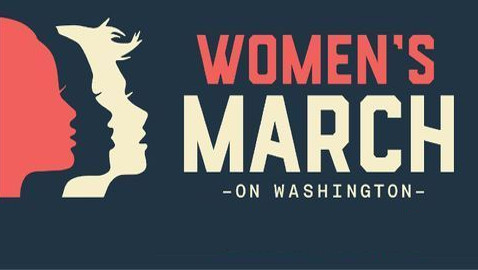 For those unable to attend that event, over 500 sister marches are being held in more than 32 countries worldwide, including 25 Canadian cities – and counting.
For those unable to attend that event, over 500 sister marches are being held in more than 32 countries worldwide, including 25 Canadian cities – and counting.
“Canadians are coming together to say loud and clear that discrimination will not be tolerated, and that we stand in support of all those who have been the targets of hatred within Canada and abroad,” said Marissa McTasney, from the National Committee of the Canadian Women’s March. “This is a show of equality, solidarity, diversity and inclusivity. We are marching in support of indigenous peoples, people of colour, Muslims, immigrants, LGBTQI+, people with disabilities, women and others.”
The outpouring of support from across Canada reflects its wide diversity, bringing together business owners, social justice groups, religious communities, labour groups, politicians, artists, students, girls, boys, women, men, and non-binary individuals – just to name a few – everyone who believes that women’s rights are human rights will be marching on January 21st 2017.
The marches, organized by a grassroots coalition – including many first time organizers – will collectively be one of the largest international demonstrations ever assembled. •
canadianwomenmarch.ca | #WMWCanada #whyimarch #womensmarch #sistersofthenorth #manifdesfemmes
CUPE: Women’s March Canada
Across Turtle Island (North America), we have seen a rise in acts of hate coinciding with the U.S. election. A group of women in Canada have come together in a grassroots effort to support initiatives happening on January 21, 2017 for human rights. A delegation from Canada will be participating in the Women’s March on Washington, DC. Local marches are also happening across Canada and globally. CUPE Ontario is a proud supporter of these initiatives to speak out and unite our communities. Join CUPE Ontario at the Toronto March or join one of the local marches taking place across the province. •
Guiding Vision and Definition of Principles
Overview & Purpose
The Women’s March on Washington is a women-led movement bringing together people of all genders, ages, races, cultures, political affiliations, disabilities and backgrounds in our nation’s capital on January 21, 2017, to affirm our shared humanity and pronounce our bold message of resistance and self-determination.
Recognizing that women have intersecting identities and are therefore impacted by a multitude of social justice and human rights issues, we have outlined a representative vision for a government that is based on the principles of liberty and justice for all. As Dr. King said, “We cannot walk alone. And as we walk, we must make the pledge that we shall always march ahead. We cannot turn back.”
Our liberation is bound in each other’s. The Women’s March on Washington includes leaders of organizations and communities that have been building the foundation for social progress for generations. We welcome vibrant collaboration and honor the legacy of the movements before us – the suffragists and abolitionists, the Civil Rights Movement, the feminist movement, the American Indian Movement, Occupy Wall Street, Marriage Equality, Black Lives Matter, and more – by employing a decentralized, leader-full structure and focusing on an ambitious, fundamental and comprehensive agenda.
#WHYWEMARCH
We are empowered by the legions of revolutionary leaders who paved the way for us to march, and acknowledge those around the globe who fight for our freedoms. We honor these women and so many more. They are #WHYWEMARCH.
Bella Abzug • Corazon Aquino • Ella Baker • Grace Lee Boggs • Berta Cáceres • Rachel Carson • Shirley Chisholm •
Angela Davis • Miss Major Griffin Gracy • LaDonna Harris • Dorothy I. Heightbell hooks • Judith Heumann •
Dolores Huerta • Marsha P. Johnson • Barbara Jordan • Yuri Kochiyama • Winona LaDuke • Audre Lorde •
Wilma Mankiller • Diane Nash • Sylvia Rivera • Barbara Smith • Gloria Steinem • Hannah G. Solomon • Harriet Tubman • Edith Windsor • Malala Yousafzai
Values & Principles
- We believe that Women’s Rights are Human Rights and Human Rights are Women’s Rights. This is the basic and original tenet for which we unite to March on Washington.
- We believe Gender Justice is Racial Justice is Economic Justice. We must create a society in which all women – including Black women, Indigenous women, poor women, immigrant women, disabled women, Muslim women, lesbian, queer and trans women – are free and able to care for and nurture themselves and their families, however they are formed, in safe and healthy environments free from structural impediments.
- Women have the right to live full and healthy lives, free of all forms of violence against our bodies. One in three women have been victims of some form of physical violence by an intimate partner within their lifetime; and one in five women have been raped. Further, each year, thousands of women and girls, particularly Black, Indigenous and transgender women and girls, are kidnapped, trafficked, or murdered. We honor the lives of those women who were taken before their time
and we affirm that we work for a day when all forms of violence against women are eliminated. - We believe in accountability and justice for police brutality and ending racial profiling and targeting of communities of color and Indigenous peoples. Women of color and Indigenous women are killed in police custody at greater rates, and are more likely to be sexually assaulted by police, and women with disabilities are disproportionately likely to experience use of force at the hands of police, and sexual assault in general. We also call for an immediate end to arming police with the military grade weapons and military tactics that are wreaking havoc on communities of color and sovereign tribal lands. No woman or mother should have to fear that her loved ones will be harmed at the hands of those sworn to protect.
- We believe it is our moral imperative to dismantle the gender and racial inequities within the criminal justice system. The rate of imprisonment has grown faster for women than men, increasing by 700% since 1980, and the majority of women in prison have a child under the age of 18. Incarcerated women also face a high rate of violence and sexual assault. We are committed to ensuring access to gender – responsive programming and dedicated healthcare including substance abuse treatment, mental and maternal health services for women in prison. We believe in the promise of restorative justice and alternatives to incarceration. We are also committed to disrupting the school–to–prison pipeline that prioritizes incarceration over education by systematically funneling our children – particularly children of color, queer and trans youth, foster care children, and girls – into the justice system.
- We believe in Reproductive Freedom. We do not accept any federal, state or local rollbacks, cuts or restrictions on our ability to access quality reproductive healthcare services, birth control, HIV/AIDS care and prevention, or medically accurate sexuality education. This means open access to safe, legal, affordable abortion and birth control for all people, regardless of income, location or education.
We understand that we can only have reproductive justice when reproductive health care is accessible to all people regardless of income, location or education. - We believe in Gender Justice. We must have the power to control our bodies and be free from gender norms, expectations and stereotypes. We must free ourselves and our society from the institution of awarding power, agency and resources disproportionately to masculinity to the exclusion of others.
- We firmly declare that LGBTQIA Rights are Human Rights and that it is our obligation to uplift, expand and protect the rights of our gay, lesbian, bi, queer, trans, two-spirit or gender non-conforming brothers, sisters and siblings. This includes access to non-judgmental, comprehensive healthcare with no exceptions or limitations; access to name and gender changes on identity documents; full anti-discrimination protections; access to education, employment, housing and benefits; and an end to police and state violence.
- We believe in an economy powered by transparency, accountability, security and equity. We believe that creating workforce opportunities that reduce discrimination against women and mothers allow economies to thrive. Nations and industries that support and invest in caregiving and basic workplace protections – including benefits like paid family leave, access to affordable childcare, sick days, healthcare, fair pay, vacation time, and healthy work environments – have shown growth and increased capacity.
- We believe in equal pay for equal work and the right of all women to be paid equitably. We must end the pay and hiring discrimination that women, particularly mothers, women of color, Indigenous women, lesbian, queer and trans women still face each day in our nation, as well as discrimination again workers with disabilities, who can currently legally be paid less than federal minimum wage. Many mothers have always worked and in our modern labour force; and women are now 50% of all family breadwinners. We stand for the 82% of women who become moms, particularly moms of color, being paid, judged, and treated fairly. Equal pay for equal work will lift families out of poverty and boost our nation’s economy.
- We recognize that women of color and Indigenous women carry the heaviest burden in the global and domestic economic landscape, particularly in the care economy. We
further affirm that all care work – caring for the elderly, caring for the chronically ill, caring for children and supporting independence for people with disabilities – is work, and that the burden of care falls disproportionately on the shoulders of women, particularly women of color. We stand for the rights, dignity, and fair treatment of all unpaid and paid caregivers. We must repair and replace the systemic disparities that permeate caregiving at every level of society. - We believe that all workers – including domestic and farm workers – must have the right to organize and fight for a living minimum wage, and that unions and other labour associations are critical to a healthy and thriving economy for all. Undocumented and migrant workers must be included in our labour protections, and we stand in full solidarity with the sex workers’ rights movement. We recognize that exploitation for sex and labour in all forms is a violation of human rights.
- We believe Civil Rights are our birthright. Our Constitutional government establishes a framework to provide and expand rights and freedoms – not restrict them. To this end, we must protect and restore all the Constitutionally – mandated rights to all our citizens, including voting rights, freedom to worship without fear of intimidation or harassment, freedom of speech, and protections for all citizens regardless of race, gender, age or disability. We honor and respect tribal laws and jurisdictions.
- We support Indigenous women’s right to access, own, develop and control land and its resources. We affirm that now is the time for the U.S. implementation of the UN Declaration on the Rights of Indigenous Peoples and to honor existing treaty rights and fulfill promises made.
- We believe that all women’s issues are issues faced by women with disabilities and Deaf women. As mothers, sisters, daughters, and contributing members of this great nation, we seek to break barriers to access, inclusion, independence, and the full enjoyment of citizenship at home and around the world. We strive to be fully included in and contribute to all aspects of American life, economy, and culture.
- We believe it is time for an all-inclusive Equal Rights Amendment to the U.S. Constitution. Most Americans believe the Constitution guarantees equal rights, but it does not. The 14th Amendment has been undermined by courts and cannot produce real equity on the basis of race and/or sex. And in a true democracy, each citizen’s vote should count equally. All Americans deserve equality guarantees in the Constitution that cannot be taken away or disregarded, recognizing the reality that inequalities intersect, interconnect and overlap.
- Rooted in the promise of America’s call for huddled masses yearning to breathe free, we believe in immigrant and refugee rights regardless of status or country of origin. It is our moral duty to keep families together and empower all aspiring Americans to fully participate in, and contribute to, our economy and society. We reject mass deportation, family detention, violations of due process and violence against queer and trans migrants. Immigration reform must establish a roadmap to citizenship, and provide equal opportunities and workplace protections for all. We recognize that the call to action to love our neighbor is not limited to the United States, because there is a global migration crisis. We believe migration is a human right and that no human being is illegal.
- We believe that every person, every community and Indigenous peoples in our nation have the right to clean water, clean air, and access to and enjoyment of public lands. We believe that our environment and our climate must be protected, and that our land and natural resources cannot be exploited for corporate gain or greed – especially at the risk of public safety and health.
- We recognize that to achieve any of the goals outlined within this statement, we must work together to end war and live in peace with our sisters and brothers around the world. Ending war means a cessation to the direct and indirect aggression caused by the war economy and the concentration of power in the hands of a wealthy elite who use political, social, and economic systems to safeguard and expand their power. •


